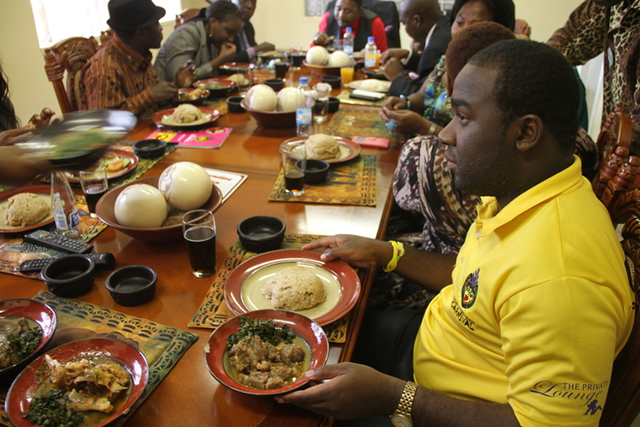TRADITIONAL TREAT

 Fanuel Kangondo and Tafadzwa Zimoyo
Fanuel Kangondo and Tafadzwa Zimoyo
An increasing appetite for traditional African cuisine has taken the market by storm with more and more people patronising restaurants that specialise in dishes that strongly reflect the Zimbabwean flavour, decor and appeal.Ordinary diners, businesspeople, politicians, celebrities and foreigners have all joined the trek to some of these traditional themed restaurants and eateries for that unique Zimbabwean experience in a traditional setting. Although not entirely new, the concept has now been refined with the advent of a health conscious clientele looking for food that builds and protects their bodies. Some of the leading hotels have also adopted the traditional food offerings with traditional themed lunches and dinners at reduced prices.
Move over fast foods as office workers troupe to the many eateries dotted around the city in search of healthy food with prices ranging from as little as $2 and even up to $25 depending on the dishes. Many suburban houses have been converted into restaurants where such foods as sadza (zviyo or mhunga), rice with peanut butter, chicken (road runner), guinea fowl, rabbit, biltong, fish, vegetables and peanut butter, knuckle bones, madora, ishwa and many other traditional foods are the main attraction.
Although fast-food outlets, oriental and Western restaurants are also multiplying, it is the trend of traditional food restaurants that has become the novelty, with the majority of the people now religiously following the traditional cuisine.
But what could be the secret behind the success of the traditional African foods outlets?
Herald Lifestyle this week went out and talked to people who run some of these restaurants, the chefs who prepare these dishes as well as those who prefer them as compared to Western fast-foods.
Names of restaurants like Pachoto, Kombahari, The Village, Nhapitapti, PaRoots, African Cuisine, Gotcha Nyama and Garwe among others, have all of a sudden become popular with diners.
These are actually competing with renowned brand names such as Chicken Inn, Chicken Slice and KFC, among others.
Tafadzwa Magurasawe, who is the manager of Nhapitapi Restaurant, said traditional dishes were the latest fad and it is clear that they were here to stay for some time before something new took the food industry by storm.
“It is clear that most people nowadays are falling in love with fast foods. This is because of their health and nutritious values, which is one good reason why medical doctors are always encouraging people to eat traditional foods,” he said.
Magurasawe said traditional foods are known to boost the immune system and it was a business that is improving the tourism sector slowly.
“We encourage people not to eat foods that contain a lot of sugar, acids and fats which are detrimental and have side effects to one’s health. We also don’t do spices, like what most of these fast-foods outlets do, as we use little oil and in most cases we use the oil that is already available in the meat we are cooking,” explained the manager.
According to Magurasawe, there is however little appreciation of the importance of traditional foods by the younger generation, who think that Western foods that contain a lot of spices and fat taste better.
“There is still a challenge with the younger generation when it comes to appreciating traditional foods, but the mature know the value that these dishes contain. So our advice to them is that if they want to stay healthy, we should revert to these types of foods that our people in the past used to eat.
“This is probably also one reason why a good number of teenagers who consume these foods that contain all this kind of unhealthy stuff suffer from diseases like cancer and they also age fast,” he said.
One person who is passionate about traditional foods is former permanent secretary for the Ministry of Tourism and Hospitality Industry Margaret Sangarwe, whose stint in the ministry saw her coming face to face with how the traditional foods are in demand especially among people of a mature inclination as well as foreigners visiting the country.
This led her to open her own restaurant in Harare’s CBD that specialises in traditional African foods. To prove how popular traditional foods are, the restaurant also boasts as part of their regular clientele VIPs like Cabinet ministers, their permanent secretaries and diplomats.
Menus at these restaurant include such delicacies as zvinyenze, nyama yembudzi, madora, mazondo, mufushwa, mowa, muriwo wetsine, nyevhe, mukaka wakakora, maheu, sadza rezviyo or remhunga and zumbani tea.
“The whole procedure of preparing sorghum or millet mealie-meal involves first roasting the grain before grinding it to fine cooking powder. When it comes to some of the traditional vegetables, they are first dried up in similar fashion that is also done to some of these meat-types. These are then cooked and sometimes dipped in peanut butter, while for breakfast we serve mbambaira (sweet-potatoes), mufarinya (cassava), madhumbe, mutakura,” explained Tawanda Mangombe, a celebrity traditional cuisine chef.
On the economic front, the flourishing of traditional foods restaurants has also increased the demand in the supply of the ingredients at places like Mbare Musika in Harare as well as from other rural and farming areas around the country. Some traders at Mbare Musika are known to do brisk business, while some suppliers from as far as Manicaland are recording good sales supplying these restaurants.
Also coming in to do business with the traditional restaurants owners are artists who design batiks and other artifacts that normally go with the ambience found in these joints.
The staffers in these restaurants, ranging from the waiters and chefs are often seen wearing African attire with some colourful motifs that normally also include the big five animals as well as birds like the guinea fowl.
“We grew up eating these traditional foods and most of them were readily available in the wild. This food was healthy and it was rare to see our elders complaining of some ailments which are affecting our youths today. I will be happy to see parents encouraging their kids to go for these traditional dishes which are good for our health and which doctors also recommend,” said Sekuru Aaron Ngundu.
Hotels have also joined in this trend of offering traditional African dishes, and some prominent personalities sometimes book tables in advance to avoid the hassles that are often associated with having to find a seating place.
Dr Elliot Chikati, PaRoots restaurant nutritionist, said some of the dishes offered by some restaurants have been tailor-made to meet the nutritional requirements of certain medical ailments.
“What one consumes so is he. There are several modern styled fast foods outlets especially in the urban areas the reason being that traditional foods are a hit but they fail on packaging,” he said. However traditional foods play an integral role in the life of a people as it states their identity.
One man’s meat is another man’s poison thus you can’ eat a cat, frogs or snakes but to some it is their delicacy.







Comments